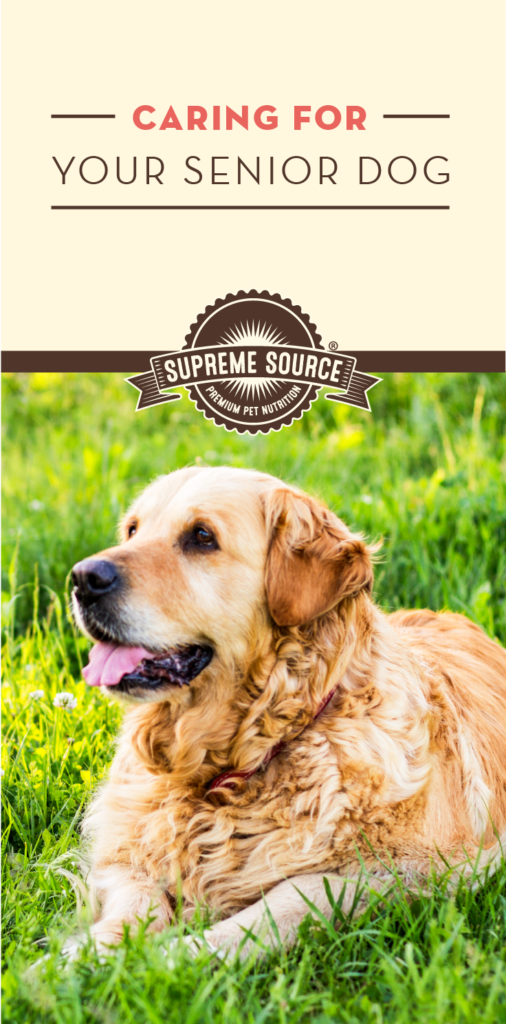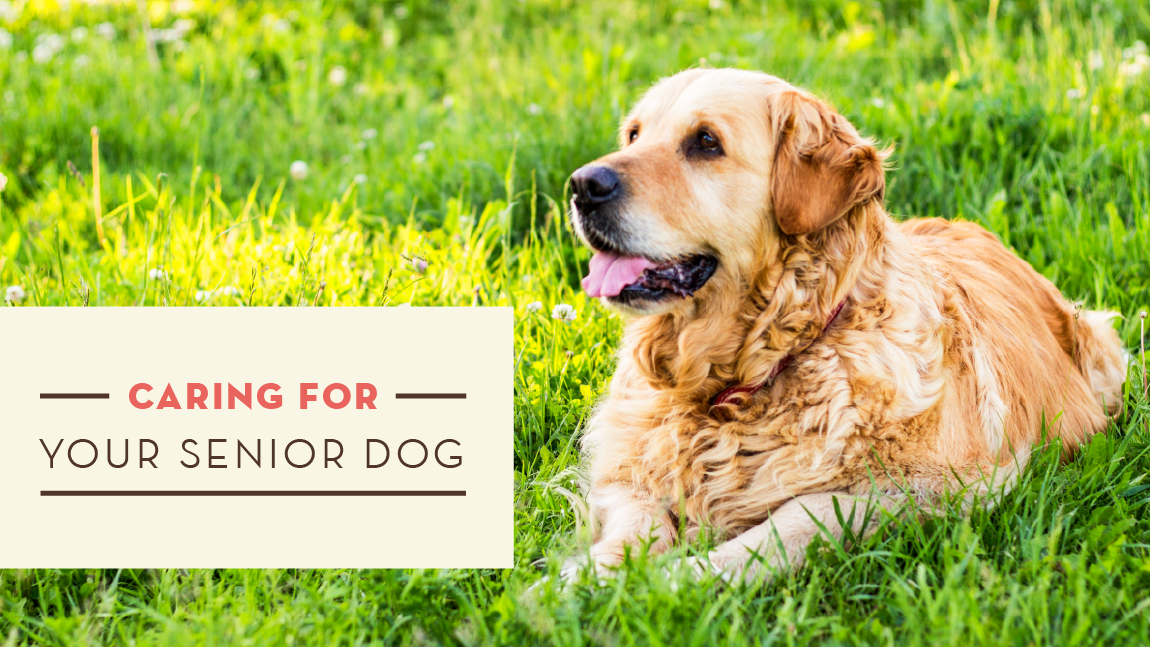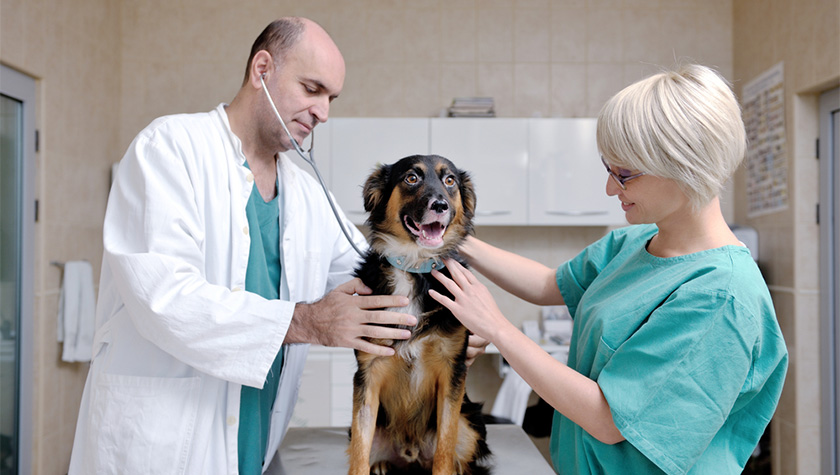When your dog is your best friend, it is easy to forget that they age much quicker than you. Dogs age at different rates depending on their breed, but in general, dogs age six and older are considered senior. Senior dogs require some special attention to ensure they live a long, happy life. Check out these tips to better understand how to take care of pups as they age.
Regular vet visits
Rather than waiting for your dog to show signs of illness, schedule yearly vet visits to monitor your pet’s health. It is easier to catch diseases and illnesses associated with aging dogs when the vet is able to monitor your dog on a regular basis.
Feed him a healthy diet
There are some dog foods that provide more nutrients and health benefits than others. As your dog gets older, protein, vitamins and minerals will become even more important to their diet. Supreme Source Dog Food is a good option for older pets because it is packed with nutrients and protein that promote a healthy digestive system, coat and an overall healthier life for your senior dog.
Brush his teeth
As dogs age, their teeth start to cause more and more problems. It is important to begin brushing your pet’s teeth at a young age and to continue doing so throughout the years. Older dogs with bad teeth may experience pain or tooth loss, which can be prevented by brushing their teeth regularly.
Keep him moving
Older dogs may be more prone to stiffness and pain associated with arthritis. The best way to make sure your dog is staying active is to keep playing with them and take them on short walks. They may not be able to run like they once did, but it is important to keep them active. Weight gain and more joint pain can occur in dogs who do not get enough exercise.
Taking care of your senior dog can be as simple as making a few small changes to their lifestyle. With your help, your pup will continue to live a long and healthy life.
FAQ
How can I keep my older dog comfortable?
Caring for an older dog requires special attention to their changing needs and potential health issues. Schedule regular veterinary check-ups to monitor your dog’s overall health, these regular examinations can help catch and address age-related health issues early.
Maintain a healthy weight for your dog. Excess weight can exacerbate joint issues and contribute to other health problems. Consult with your veterinarian to determine an appropriate diet and feeding plan. Seek dog foods with ingredients like seaweed that help boost your dog’s health and longevity by supporting their immune system.
Supreme Source is your partner for nutritious dog food plans that can help improve your dog’s joint health, promote weight loss, and improve quality of life.
What health risks can my dog have as he ages?
As dogs age, they become more susceptible to certain health conditions. If you have any health concerns or general worries about the health status of your dog, make sure to consult with a veterinarian before making changes to your dog’s current routine.
While not every dog will experience the same challenges, some common health risks associated with aging in dogs include: Arthritis and Joint Issues, Dental Issues, Vision and Hearing Loss, Cancer, Heart Disease, Obesity, and other health-related issues.
Supreme Source does not give medical advice, so please check with a veterinarian to ensure your older pet is getting the attention they need. Regular veterinary check-ups, preventive care, and a healthy lifestyle can help manage and address many of these age-related health risks.
Early detection and intervention are crucial for maintaining the well-being of aging dogs. If you notice any changes in your dog’s behavior, appetite, or overall condition, consult with your veterinarian promptly. They can provide guidance on appropriate care and diagnostic measures based on your dog’s individual health needs.
How do I help alleviate my older dog’s pain?
Alleviating pain in older dogs requires a multifaceted approach that may include lifestyle adjustments, veterinary care, and, in some cases, medication. Early detection of issues can lead to more effective management.
Your veterinarian may prescribe pain management medications, such as nonsteroidal anti-inflammatory drugs (NSAIDs) or other analgesics, to help relieve pain associated with arthritis or other conditions. Always follow your vet’s recommendations and dosage instructions.
Feed your dog a balanced and nutritious diet that supports their overall health. Certain diets may include ingredients to help manage inflammation and pain. Offering nutritious food and fresh water can go a long way.
How can I support my dog as he ages?
Supporting your aging dog involves providing attentive care to address their changing physical, mental, and emotional needs. Schedule regular check-ups with your veterinarian to monitor your dog’s overall health. Early detection of age-related issues allows for prompt intervention and management.
Feed your dog a nutritionally balanced and age-appropriate diet. Consult with your veterinarian to determine the best diet for your dog.
Provide regular, low-impact exercise to keep your dog physically active. Adapt the exercise routine based on your dog’s individual needs, considering their health conditions and mobility.
Tailor your care approach based on your dog’s individual health condition, breed, and preferences. Regular communication with your veterinarian is essential for providing optimal care and addressing any specific needs your senior dog may have.
How does feeding change for a senior dog?
Feeding changes for a senior dog are typically based on their changing nutritional needs, metabolism, and health considerations. While individual needs can vary, it is good to keep in mind how your dog’s metabolism and activity levels will impact how much it will need to eat.
Senior dogs often have a decreased metabolism and lower activity levels compared to their younger counterparts. Adjust their calorie intake to prevent weight gain. If your dog is less active, you may need to reduce the portion size of their regular food or switch to a formula that is lower in calories.
Remember that individual dogs may have unique dietary requirements, and these general guidelines might need to be adjusted based on your dog’s specific health condition, breed, and lifestyle. Regular communication with your veterinarian is crucial to ensuring your senior dog receives the best possible nutrition tailored to their individual needs.
Does Supreme Source offer food specifically for older dogs?
Supreme Source dog food offers a nutritious blend of food packed with protein, minerals, vitamins, amino acids, and other key nutrients for this stage of life including seniors.
Try Supreme Source dog food at your local retailer today and see how our unique blend of vitamins, protein, and antioxidants can help your dog have a balanced diet.





